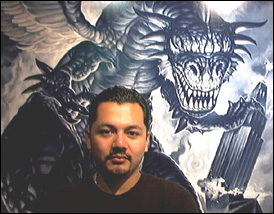April 2000 field recordings by Scout Finch |
|||||||||||||||||||||||||||||||||
|
THE JOSE GUZMAN INTERVIEW: "If you say no to them, it's pretty much like saying, 'Hey, come to my house and kill me.'"
You were born and raised in El Salvador. JG: Yeah. How long did you live there? JG: 'Til I was about 12, 12 ½. What town? JG: San Salvador, the capitol. Is that a big place? JG: Actually, no. The whole country is smaller than California. It's the tiniest country in Latin America. How big would you say San Salvador is? JG: The city of San Salvador is pretty small. It's like San Francisco, downtown. I like to think of world capitols as being bigger. JG: Well, when you're there it seems pretty big. [But it's] not really, actually...the streets are really tiny; everything is on a smaller scale. And when I came here [to the USA], I was like, "Wow!" Especially the freeway, all these lanes. It was totally unheard of. A street that is so big that you could go that fast is pretty much unheard of. Unless you're going off-road. You know, if you're going from San Salvador to one of the smaller departments -- they're separated by, it's called "departamentos" in Spanish. I guess it would translate to departments. Like counties? JG: Kind of, yeah. Like counties, I guess. And if you're going from one county to another, obviously, like going from here to Daly City, there's not major streets, sometimes. It's just one road in the middle of the wilderness. You just fly through that; it's the closest thing you're going to get. But it's one lane going, one lane coming back. Paved? JG: Yeah, it's paved, for the most part. Most of the stuff is paved now. A lot of it was destroyed because of the war. A lot of the bridges were blown up. Which war? JG: The Civil War that started back in the 1970s [and lasted] all the way until about 1990, actually. In El Salvador? JG: Yeah, it lasted about 14-15 years. Do you still have family there? JG: All my family is there, with the exception of my immediate family: mom, dad, brother and sister. So why did your immediate family move? JG: It was mostly because of the war. My dad decided to stay out of the whole thing. What made him decide to come [to the USA] was my aunt. My family, as far as my dad's side, was very involved in the war. My dad comes from a military family. So most of my family on his side was involved in the war, but within the family we also had a couple of people, including my aunt, who were helping out the guerillas. Not so much to screw over the government or anything like that, but she would help out [with] shelter, [or] when she knew they needed supplies. She would help out [at] camps or bases where she knew they were holing up, where they [were] injured or whatever. She was more like [what] you would call the Red Cross; doing a good job. That's what she would try to do. But I assume that this stuff must not have been real well received by the military. JG: Yeah. The government viewed her, obviously, as treasonous. They blamed her for going against the government, so she had to leave the country. She fled because she knew they were going to come after her for some stuff that had happened--she had sold her car to an American ambassador, or someone like that, I think it was more of a religious leader. And there was an order for that ambassador to get murdered. So they watched her car until they knew where he was going, and then they ambushed it. They just sprayed it [with bullets]. And [even though] the car was totally destroyed, it was still under her name, so the whole investigation came back to her. She knew they were going to try to blame her for this--when she was not really involved--so she took off. And then they came and grabbed my dad, to interrogate him. Really? JG: Yeah. Now, the thing is, do you [remember the movie] "Faces of Death"? El Salvador's interrogations are in "Faces of Death." It's pretty bad. They ask you to go into interrogation, you go to the main military base, and they take you downstairs. [There's a] 99% chance you're not coming back out. That's pretty much the way it works, and there's nobody you can talk to. You're fucked. The government runs everything. So they took him there. He was there practically all day. Towards the end, because of the fact that we have military family, they ended up letting him go, but they told him not to go too far. So before it even got any further than that, my grandparents just told him, "You know what? Get out of here." Was he tortured?
in the junk drawer:
|
|















